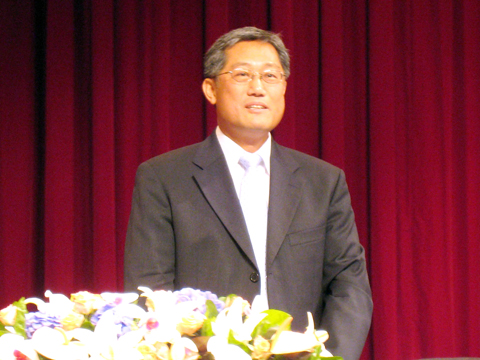Lee Kun-yao (李焜耀), chairman of AU Optronics Corp (友達) and Qisda Corp (佳世達), was acquitted on six charges including insider trading, stock manipulation and embezzlement after a two-year trial.
The executive of Qisda, the electronics maker formerly known as BenQ Corp (明基電通), was cleared by a Taoyuan District Court judge of using insider information to trade stock before the public disclosure of financial statements.
Lee, 56, was indicted two years ago for alleged crimes during his tenure as chairman of BenQ, which at the time was Taiwan’s biggest maker of mobile phones.

PHOTO: SU CHIN-FENG, TAIPEI TIMES
The company lost a total of NT$32.84 billion (US$997 million) in 2005 and 2006 after buying Siemens AG’s unprofitable handset unit.
“I’m pleased with the verdict,” Kevin Hsiao, Lee’s lawyer said outside the court yesterday.
Lee was also acquitted on charges of breach of trust, money laundering and forgery.
Qisda fell 4.9 percent to close at NT$13.55 in Taipei, before the ruling. The stock has more than doubled this year, after falling to a record low of NT$5.17 last November. AU declined 3 percent to NT$32.15 yesterday.
The two years of losses at BenQ, which became Taiwan’s biggest mobile-phone maker after buying Siemens AG’s handset unit in 2005, erased all the profit it had made since 1999.
The company filed for insolvency protection for its European business in September 2006 and sold its camera business, office buildings in Taiwan and part of its stake in AU Optronics.
Former BenQ president Sheaffer Lee (李錫華), ex-chief financial officer Eric Yu (游克用), Alex Liu (劉維宇), who was associate vice president in the finance department, and Liu Da-wen (劉大文), an accounting manager, were also acquitted by the court yesterday.
In May 2007, prosecutors alleged the BenQ executives used Creo Venture Corp, a Malaysian unit formed in 2002, to trade employees’ bonus shares.
The BenQ officials paid income taxes with proceeds from the transactions, prosecutors said.
Creo held 25.9 million BenQ shares as of March 20, 2006, making it the ninth-largest shareholder in BenQ, prosecutors said.

SEMICONDUCTORS: The firm has already completed one fab, which is to begin mass producing 2-nanomater chips next year, while two others are under construction Taiwan Semiconductor Manufacturing Co (TSMC, 台積電), the world’s largest contract chipmaker, plans to begin construction of its fourth and fifth wafer fabs in Kaohsiung next year, targeting the development of high-end processes. The two facilities — P4 and P5 — are part of TSMC’s production expansion program, which aims to build five fabs in Kaohsiung. TSMC facility division vice president Arthur Chuang (莊子壽) on Thursday said that the five facilities are expected to create 8,000 jobs. To respond to the fast-changing global semiconductor industry and escalating international competition, TSMC said it has to keep growing by expanding its production footprints. The P4 and P5

DOWNFALL: The Singapore-based oil magnate Lim Oon Kuin was accused of hiding US$800 million in losses and leaving 20 banks with substantial liabilities Former tycoon Lim Oon Kuin (林恩強) has been declared bankrupt in Singapore, following the collapse of his oil trading empire. The name of the founder of Hin Leong Trading Pte Ltd (興隆貿易) and his children Lim Huey Ching (林慧清) and Lim Chee Meng (林志朋) were listed as having been issued a bankruptcy order on Dec. 19, the government gazette showed. The younger Lims were directors at the company. Leow Quek Shiong and Seah Roh Lin of BDO Advisory Pte Ltd are the trustees, according to the gazette. At its peak, Hin Leong traded a range of oil products, made lubricants and operated loading

The growing popularity of Chinese sport utility vehicles and pickup trucks has shaken up Mexico’s luxury car market, hitting sales of traditionally dominant brands such as Mercedes-Benz and BMW. Mexicans are increasingly switching from traditionally dominant sedans to Chinese vehicles due to a combination of comfort, technology and price, industry experts say. It is no small feat in a country home to factories of foreign brands such as Audi and BMW, and where until a few years ago imported Chinese cars were stigmatized, as in other parts of the world. The high-end segment of the market registered a sales drop

Citigroup Inc and Bank of America Corp said they are leaving a global climate-banking group, becoming the latest Wall Street lenders to exit the coalition in the past month. In a statement, Citigroup said while it remains committed to achieving net zero emissions, it is exiting the Net-Zero Banking Alliance (NZBA). Bank of America said separately on Tuesday that it is also leaving NZBA, adding that it would continue to work with clients on reducing greenhouse gas emissions. The banks’ departure from NZBA follows Goldman Sachs Group Inc and Wells Fargo & Co. The largest US financial institutions are under increasing pressure